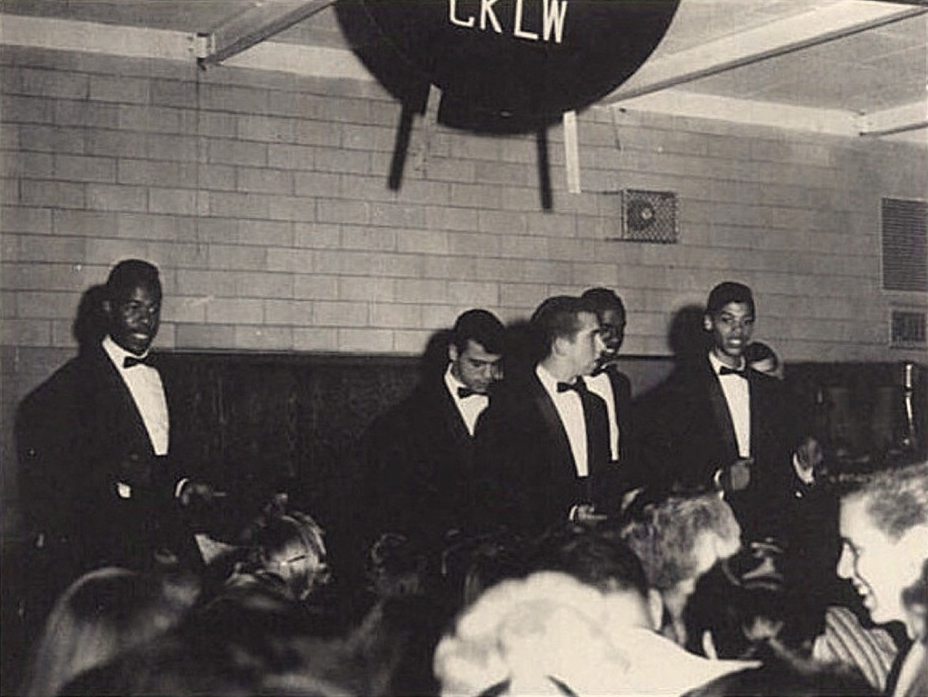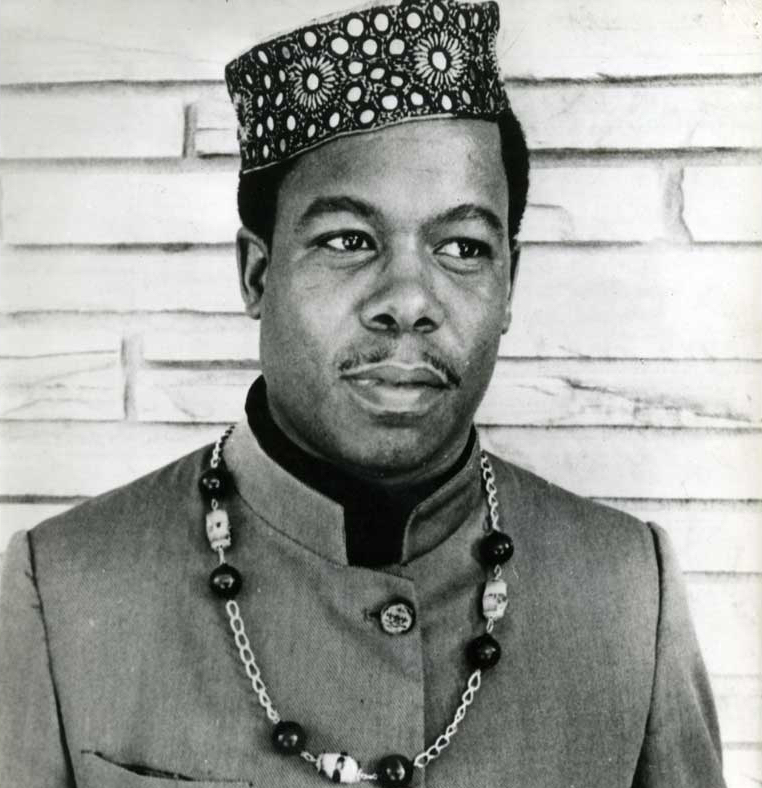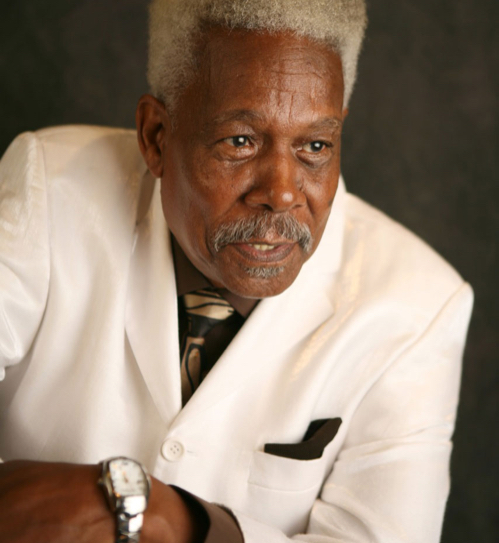
A half century later, the answer seems both obvious and remarkable: never. Since its release, Floyd’s “Knock on Wood” has become one of the defining hits of the Memphis soul sound and has since been covered by everyone from Otis Redding to David Bowie. But as iconic as that signature song is, it’s only one of many milestones in Eddie Floyd’s truly extraordinary career.
Eddie Floyd was born in Montgomery, AL, in 1937, but grew up in Detroit, where his uncle Robert West owned the Lupine and Flick record labels, two early competitors to the legendary Motown label. There, Floyd co-founded the Falcons, an R&B vocal group that preceded other Detroit groups like The Temptations and The Four Tops. Alongside Floyd, the group would eventually add fellow future soul legends like Mack Rice and Wilson Pickett. In 1959, the group scored a Top Twenty Pop hit with “You’re So Fine,” giving Floyd his first taste of national success. Three years later, The Falcons scored a follow-up hit with “I Found a Love,” backed by the group The Primettes (who would go on to become The Supremes).
Following the breakup of The Falcons in 1963, Eddie Floyd relocated to Washington D.C. where he co-founded the label Safice with then-DJ (and future Stax president) Al Bell. At Safice, Floyd made his first solo recordings, but fate soon intervened. “All the records we released on Safice pretty much came out around the same time. Then, when Al Bell got a call from Jim Stewart at Stax asking him to come down and take over promotion and stuff, that’s when we decided not to continue with Safice. So from there, Al and I went down to Memphis, and that was my introduction to Stax,” Floyd recalled.


At Stax, Floyd immediately felt at home, seeing many parallels between the music scenes of Detroit and Memphis. “Though I’d had nothing directly to do with Motown while I’d been in Detroit, I’d still been around a lot of their artists and seen from a distance how they did things. And so, when I eventually got to Memphis, I could see that it was pretty much the same… you know, musicians getting together producing music, with everybody in the same groove. So, yeah, working at Stax was very easy, because everybody was open-minded,” Floyd recalled.
Initially working as a songwriter and producer for the studio, Floyd quickly began to form a relationship with Booker T and the MGs guitarist Steve Cropper, who became his de-facto songwriting partner over the subsequent years. “Every chance I get I’ll work with Steve,” he said in 1968. “He’s very easy to work with because we think alike.” In fact, Floyd’s first hit song for Stax as a songwriter was a track he co-penned with Cropper called “Comfort Me,” which was recorded in 1965 by Carla Thomas. The following year, Floyd reunited with his former Falcon’s band member Wilson Pickett, providing him with the classic tune “634-5789 (Soulsville, USA),” an eventual number one R&B hit.
Around the same time, Floyd began recording as a solo artist, releasing his first Stax single “Things Get Better” to little avail. That summer, Floyd and Cropper began working on a slate of new songs, one of which would quickly launch Floyd into soul music stardom. “Steve and I set out to write a song about superstition, you know, good luck. We were writing it at the Lorraine Motel in 1966 in Memphis. While we were trying to come up with the song, there was this huge thunder and bright lightning. That’s how I came up with the line, ‘Like thunder, lightning, the way I love you is frightening.’ So it became a love song.” Although originally intended for Otis Redding, the demo version of “Knock on Wood” that Floyd had recorded so impressed Atlantic’s Jerry Wexler that he convinced Stax president Jim Stewart to release it as a single. Wexler’s instincts proved correct as “Knock on Wood” became Stax’s third number one R&B hit of the year.
Over the next four years, Floyd followed up his success with a string of other Top 40 hits including “Raise Your Hand,” “On a Saturday Night,” “I’ve Never Found a Girl (To Love Me Like You Do),” and a hit version of Sam Cooke’s “Bring It on Home to Me.” In 1968, he recorded a song that failed to reach the charts, but which has become a fan favorite and a standout within Stax’s deep catalogue. “Big Bird” was Eddie Floyd’s garage rock-tinged ode to fallen Stax labelmate and friend Otis Redding, which he wrote at a London airport on the way to Redding’s funeral. “As we were taxiing to take off, a problem developed with the engine. I was hoping the plane would leave and wrote ‘Big Bird’ as a way to coax it into flight.”

Throughout his successful solo career, Floyd continued to churn out hit songs for nearly every other artist on the Stax roster, including Sam and Dave’s “You Don’t Know What You Mean to Me,” Johnnie Taylor’s “Just the One (I’ve Been Looking For),” and Rufus Thomas’ “The Breakdown.” “You know, Stax was all about teamwork,” Floyd recalled. “Like if an artist was recording and needing backing singers, I’d go and sing on their record, and in turn they’d sing on mine! That’s just the way we did things.”
As the tumultuous 1970s rolled in, Floyd began experimenting with his music, pushing the patented “Stax sound” into new and unfamiliar territory. This is especially true of his 1971 album Down to Earth, which leaned heavily on psychedelic rock and loose-flowing jams. Although it failed to make much of an impact commercially, it’s now seen as one of the most radical releases from Stax and a testament to Floyd’s creativity. As the decade rolled on, however, the label began dealing with an increasing amount of trouble, causing many artists to jump ship. Despite the turmoil and financial insecurity, Floyd’s sense of familial loyalty kept him at the label that he had helped to shape until Stax’s ultimate bankruptcy in 1975.
With Stax’s doors now shuttered for good, Floyd moved on to Southern soul label Malaco, before moving on to the UK record label I-Spy. After a few years out of the public limelight, Floyd remerged in 1989 to perform at President Bush’s inaugural ball and also joined his old Stax collaborators Steve Cropper and Duck Dunn on a series of world tours as part of The Blues Brothers Band. In 1998, Floyd reunited with Wilson Pickett yet again to sing a duet version of “634-5789” in the film Blues Brothers 2000. In 2008, Floyd signed with the newly-revived Stax Records label and released the album Eddie Loves You So, a collection of previously unrecorded songs spanning back to his days with The Falcons.
Now in his 80s, Eddie Floyd shows no sign of slowing down, continuing to perform and record with a fervor that would make much younger artists envious. “Soul music is a feeling,” Floyd stated in 2011. “It’s genuine. Audiences respond to soul singers, not just the music. But to be effective, a soul singer needs to feel the words and to send out those feelings.” For the better part of a century, Eddie Floyd has been doing just that.

Be the first to add your voice.